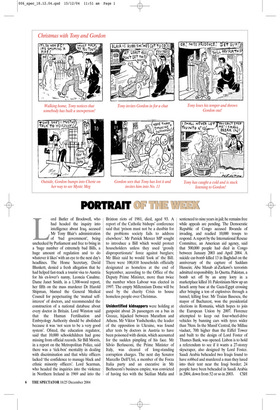PORTRAIT OF THEWEEK L ord Butler of Brockwell, who had headed
the inquiry into intelligence about Iraq, accused Mr Tony Blair’s administration of ‘bad government’, being unchecked by Parliament and free to bring in a ‘huge number of extremely bad Bills, a huge amount of regulation and to do whatever it likes’ with an eye to the next day’s headlines. The Home Secretary, David Blunkett, denied a fresh allegation that he had helped fast-track a tourist visa to Austria for his ex-lover’s nanny, Leoncia Casalme. Dame Janet Smith, in a 1,300-word report, her fifth on the mass murderer Dr Harold Shipman, blamed the General Medical Council for perpetuating the ‘mutual selfinterest’ of doctors, and recommended the construction of a national database about every doctor in Britain. Lord Winston said that the Human Fertilisation and Embryology Authority should be abolished because it was ‘not seen to be a very good system’. Ofsted, the education regulator, said that 10,000 schoolchildren had gone missing from official records. Sir Bill Morris, in a report on the Metropolitan Police, said there was a ‘tick-box’ mentality in dealing with discrimination and that white officers lacked ‘the confidence to manage black and ethnic minority officers’. Lord Scarman, who headed the inquiries into the violence in Northern Ireland in 1969 and into the Brixton riots of 1981, died, aged 93. A report of the Catholic bishops’ conference said that ‘prison must not be a dustbin for the problems society fails to address elsewhere’. Mr Patrick Mercer MP sought to introduce a Bill which would protect householders unless they used ‘grossly disproportionate’ force against burglars; Mr Blair said he would ‘look at’ the Bill. There were 100,810 households officially designated as homeless at the end of September, according to the Office of the Deputy Prime Minister, more than twice the number when Labour was elected in 1997. The empty Millennium Dome will be used by the charity Crisis to house homeless people over Christmas.
Unidentified kidnappers were holding at gunpoint about 26 passengers on a bus in Greece, hijacked between Marathon and Athens. Mr Viktor Yushchenko, the leader of the opposition in Ukraine, was found after tests by doctors in Austria to have been poisoned with dioxin, which accounted for the sudden pimpling of his face. Mr Silvio Berlusconi, the Prime Minister of Italy, was cleared of long-standing corruption charges. The next day Senator Marcello Dell’Utri, a member of the Forza Italia party and an executive in Mr Berlusconi’s business empire, was convicted of having ties with the Sicilian Mafia and sentenced to nine years in jail; he remains free while appeals are pending. The Democratic Republic of Congo accused Rwanda of invading, and readied 10,000 troops to respond. A report by the International Rescue Committee, an American aid agency, said that 500,000 people had died in Congo between January 2003 and April 2004. A suicide car-bomb killed 13 in Baghdad on the anniversary of the capture of Saddam Hussein; Abu Musab al-Zarkawi’s terrorists admitted responsibility. In Quetta, Pakistan, a bomb set off by an army lorry in a marketplace killed 10. Palestinians blew up an Israeli army base at the Gaza-Egypt crossing after bringing a ton of explosives through a tunnel, killing four. Mr Traian Basescu, the mayor of Bucharest, won the presidential elections in Romania, which hopes to join the European Union by 2007. Florence attempted to keep out four-wheel-drive vehicles by banning cars with tyres wider than 70cm. In the Massif Central, the Millau viaduct, 70ft higher than the Eiffel Tower and built to the design of Lord Foster of Thames Bank, was opened. Lisbon is to hold a referendum to see if it wants a 27-storey skyscraper, also designed by Lord Foster. Saudi Arabia beheaded two Iraqis found to have robbed and murdered a man they lured into their tent near the Iraqi border; 24 people have been beheaded in Saudi Arabia in 2004, down from 52 or so in 2003. CSH

















































































 Previous page
Previous page